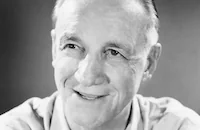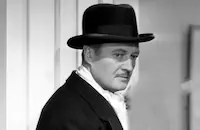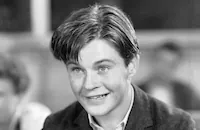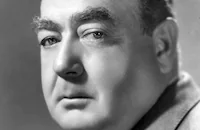Black Sheep

Brief Synopsis
Cast & Crew
Allan Dwan
Edmund Lowe
Claire Trevor
Tom Brown
Eugene Pallette
Adrienne Ames
Film Details
Technical Specs

Synopsis
On the second-class level of the S.S. Olympus Southampton , society debutante Janette Foster, who attracts men's attention by trying to use an unfilled cigarette lighter, gets a light from cynical professional gambler John Francis Dugan. When Dugan learns who she is, he tries to avoid her because of her unsavory reputation; however, they become friends and sneak into the first-class section together. There they see young Fred Curtis lose twelve thousand dollars playing poker with wealthy oilmen Colonel Upton Calhoun Belcher and Orville Schmelling. Fred's mistress, Mrs. Millicent Caldwell Bath, then blackmails him into agreeing to take a stolen pearl necklace through customs by threatening to present his phony notes for twenty thousand dollars to the police. After Janette stops the distraught Fred from jumping overboard, Dugan has her move into first class to arrange a poker game with the oilmen. Dugan then wins Fred's overdrawn check from Belcher, and when he returns it to Fred, he notices a picture of Fred's deceased mother. Recognizing her as his former wife, Dugan realizes that Fred is his son. In a drunken state, he explains to Janette that Mrs. Curtis, his wife's snobbish Bostonian mother, convinced her to leave him. After his wife died, he enlisted during World War I, and later, unable to get a job, he took up cards. Dugan lures Mrs. Bath into offering him money to take the necklace through customs because Fred has refused. Dugan finds Fred's notes in Mrs. Bath's room and, after discovering the pearls hidden in a walking stick, replaces them with aspirin tablets. Fred then offers to take the necklace, and because Dugan is now under guard to keep him from gambling, Mrs. Bath agrees. At the dock, Dugan puts the pearls in Belcher's jacket, and when they fall out and Mrs. Bath claims them, she is arrested. After returning Fred's notes, Dugan tells him to quit gambling and informs Mrs. Curtis that Fred does not know his identity. He takes a taxi with Janette, who now has her lighter filled. After they kiss, she remarks that she won't need to use it anymore.

Director

Allan Dwan
Cast

Edmund Lowe

Claire Trevor

Tom Brown

Eugene Pallette

Adrienne Ames

Herbert Mundin

Ford Sterling
Jed Prouty

Billy Bevan
David Torrence
Mary Blackwood
John Rogers
Ed Cecil
Grace Goodall
James B. "pop" Kenton
Silvia Vaughan
Allan Conrad
Gloria Roy
Richard (tex) Brodus
Marion Weldon
Dick Webster
Colin Kenny
Slim Martin
Douglas Gordon
Don Brodie
Libby Taylor
Robert Elliott
Dell Henderson
Wade Boteler
Richard Powell
Maude Turner Gordon
Edwin Stanley
Reginald Sheffield
Joseph Reilly
Crew
Sid Bowen
Sidney Clare
Duncan Cramer
Allan Dwan
Samuel Kaylin
Joe Lashelle
Oscar Levant
George Leverett
Arthur Miller
Allen Rivkin
Royer
Alexander Troffey
Sol M. Wurtzel

Film Details
Technical Specs

Articles
Black Sheep
In retrospect, film scholars can look back on his long career with respect and amazement, but, in the mid-1930s, Dwan was concerned that he would not survive the continuing sound era. Many successful silent-era directors did not. At the time, he was not under contract to any studio, and he did not have any prospects on the horizon. Dwan decided the best course of action to re-establish himself in the sound era was to write an original story and shop it around to the studios. He quickly penned a story he titled "Baa Baa Black Sheep" and sold it to Fox Film (shortly before the merger with Twentieth Century Pictures) on the condition that he direct it.
The "black sheep" of the title are the two main characters, John Francis Dugan, played by established leading man Edmund Lowe, and Janette Foster, played by young starlet Claire Trevor. Dugan and Foster meet aboard an ocean liner bound for New York City. Dugan, a professional gambler, fleeces the unsuspecting passengers, while Foster is a less-than-successful actress who depends on the kindness of well-heeled men. Of course, both have hearts of gold beneath their world-weary personas and disreputable behavior. One evening, while enjoying themselves on the first-class deck, they notice that two crooked poker players are cheating Fred (Tom Brown), a naïve young man who is in over his head. The pair decides to help Fred by protecting him from the predators--both male and female--who are aboard the ship. In the process, Dugan discovers that Fred is his son from a long-ago marriage to a Boston blueblood.
Black Sheep features several themes, character types, and narrative tropes that Dwan used and re-used throughout his career, including characters who are gamblers, a conflict revolving around a father and son, and a theme related to class issues. Social class is so essential to the story that it is reflected in the architecture of the ship. First-class passengers are located on the top deck and socialize in large, lavish public salons and cabins, while second-class passengers are located a deck below and move about in small, plain public spaces. Dwan's camera freely pans and tracks around the first-class deck, emphasizing its size and feeling of luxury. The camera then tilts down to show the second-class level; it is not only a literal move downward in space but also a drop in social status.
Class distinctions--and prejudices--are suggested by the signs attached to the stairwells. The signs warn passengers from the lower levels not to enter the first-class deck. Dugan and Foster are second-class passengers, but they sneak up the stairs to take advantage of the amenities offered to the upper crust. The ship's detective creeps about looking for any violators of the rules, serving as a metaphor for the barriers to class mobility. When Black Sheep was released, Americans were still in the midst of the Depression. Class differences was a theme relevant to the devastated middle and working classes for whom upward mobility was no longer possible.
Also significant is the moral corruption of the upper class, a common theme during the Depression. Dugan and Foster may be rogues, but the wealthy poker players and the rich adventuress who has her claws in young Fred are cruel and perverse. Mrs. Millicent Caldwell Bath(Adrienne Ames) loans young Fred money to pay off his poker debts but insists that he sign over several I.O.U.s to her. She uses them to blackmail Fred into carrying a stolen necklace through customs. Mrs. Bath stole the pearl necklace from European royalty just for the thrill of it, suggesting her depraved personality.
Reviewers criticized Black Sheep's familiar story twists and slight characterizations, but like many films from classic Hollywood, the cast elevated the material. Jed Prouty and gravelly voiced Eugene Pallette were cast as the cynical card sharps who take advantage of young Fred, played by a bland Tom Brown. Adrienne Ames is appropriately sly and slinky as the kleptomaniac vamp, Mrs. Bath. In a nod to the silent era, Dwan cast Ford Sterling, one of the original Keystone Kops, to play the ship's detective, Mather.
Despite a twenty-year age difference, the two main stars exhibited a nice onscreen chemistry. Edmund Lowe's star image was essential to the creation of likable gambler John Francis Dugan. The actor's debonair manner and mellifluous voice gave him the sophistication Dugan needed to mingle with the wealthy classes, but it also softened the cynical, roguish nature of his character to make him sympathetic to viewers.
Black Sheep was Claire Trevor's ninth feature film in three years, but she had yet to be cast in her breakthrough role. Fox producer Sol M. Wurtzel bought Dwan's "Baa Baa Black Sheep" because he thought it would be perfect for Trevor. Wurtzel had taken a special interest in the actress, and he actively scouted material for her. Trevor had not yet developed her trademark vocal style with its measured inflections, but her early stage experience served her well in handling the dialogue, especially her banter with Lowe, and the quips she tossed out with expert timing. Lowe remarks to Janette regarding Mrs. Bath and Fred, "This dame is too smart for him." Janette tosses back, "Aren't we all." Earlier, when explaining why she lost her last job on the stage, she divulges, "They wanted me to play the salad but without the dressing," implying the producers wanted her to strip down.
Black Sheep did not become Trevor's breakthrough film, but it was successful enough for Fox to offer Dwan a contract. Wurtzel was sufficiently pleased and asked Dwan to come up with something else for Trevor. Black Sheep turned out to be the first of seven movies that Trevor made with Dwan between 1935 and 1937, a series of diverse films that seasoned her as a screen actress. Trevor would finally have a breakthrough role in 1937, costarring in William Wyler's Dead End, where she earned an Academy Award nomination as Best Supporting Actress.
By Susan Doll
Producer: Sol M. Wurtzel for Fox Film
Director: Allan Dwan
Screenplay: Allen Rivkin from the original story "Baa Baa Black Sheep" by Allan Dwan
Cinematography: Arthur Miller
Editor: Alex Troffey
Art Direction: Duncan Cramer
Costume Design: Royer
Music: Oscar Levant with lyrics by Sidney Clare
Cast: John Francis Dugan (Edmund Lowe), Janette Foster (Claire Trevor), Colonel Upton Calhoun Belcher (Eugene Pallette), Fred Curtis (Tom Brown), Mrs. Millicent Caldwell Bath (Adrienne Ames), Mather (Ford Sterling), Orville Schmelling (Jed Prouty), Alfred (Billy Bevan), Captain Savage (David Torrence), Oscar (Herman Mundin)
1935 B&W 76 mins.

Black Sheep
Quotes
Trivia
Notes
Allan Dwan's original, unpublished story was entitled "Baa Baa Black Sheep." Mildred Harris Chaplin was listed in an advance news item as being in the film, but no corrobating evidence of her participation has been located.














